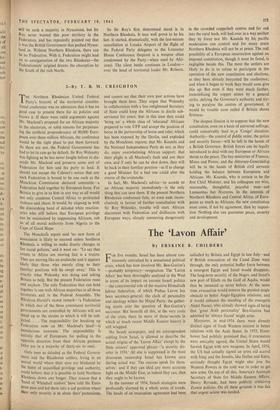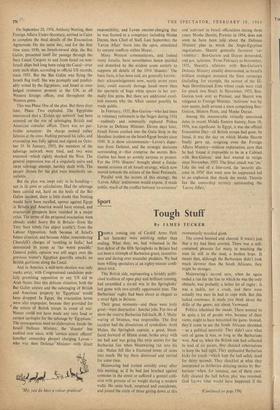The `Lavon Affair'
By ERSKINE B. CHILDERS FM five months, Israel has been almost con- tinuously convulsed by a sensational political crisis, which has now involved Mr. Ben-Gurion's —probably temporary—resignation. The `Lavon Affair' has been thoroughly analysed in the West in terms of its impact on current Israeli politics --the controversial role of the massive Histadruth labour federation, of which Pinhas Lavon has been secretary-general; the clash of personality and ideology within the Mapai Party; the gather- ing, storm over the question of Ben-Gurion's successor. But beneath all this, at the very roots of the crisis, there lie more of those•secrets in which so much recent Middle Eastern history is still wrapped.
No Israeli newspaper, and no correspondent cabling from Israel, is allowed to describe the actual origins of the `Lavon Affair' except by the State censors' approved phrase—`a security dis- aster in 1954.' All else is suppressed in the most draconian censorship Israel has known save during actual war. The reasons speak for them- selves: and if they can shed any more accurate light on the Middle East, as indeed they can, then they ought to be known.
In the summer of 1954, Israeli strategists were profoundly alarmed by a whole series of trends. The heads of an evacuation agreement had been initialled by Britain and Egypt in late July—and if British evacuation of the Canal Zone went through, the only potential buffer force between a resurgent Egypt and Israel would disappear. The long-term security of the Negev, and Israel's new port of Eilath on the Gulf of Aqaba, would thus be menaced as never before. At the same time, evacuation would remove the greatest single obstacle to better Anglo-Egyptian relations; and it would enhance the standing of the emergent Abdel Nasser, who already showed signs of being that 'great Arab personality' Ben-Gurion had admitted he 'always feared' might arise.
Moreover, in mid-1954 there were already distinct signs of fresh Western interest in better relations with the Arab States. In 1953, Eisen- hower had publicly promised that, if evacuation were amicably agreed, the United States would furnish Egypt with new weapons. In April, 1954, the US had actually signed an arms aid accord with Iraq; and the Israelis, like Dulles and Eden, seriously thought Egypt might also join the Western Powers in the cold war in order to get new arms. On top.of all this, America's Assistant Secretary of State for Middle Eastern Affairs, Henry Byroade, had been publicly criticising Zionist policies. On all these grounds it was felt that urgent action was needed. On September 28, 1954, Anthony Nutting, then Foreign Affairs Under-Secretary, arrived in Cairo to complete the final details of the Evacuation Agreement. On the same day, and for the first time since 1950, an Israeli-owned ship, the Bat Galim, presented itself for passage through the. Suez Canal. Cargoes to and from Israel on non- Israeli ships had long been using the Canal—over sixty such ships, according to official US records, since 1951. But the Bat Galim was flying the Israeli flag itself. She was promptly and predict- ably seized by the Egyptians; and Israel at once lodged strenuous protests at the UN, at all Western foreign offices, and throughout the Western press.
This was Phase One of the plan. But three days later, Phase Two exploded. The Egyptithis announced that a 'Zionist spy network' had been arrested on the eve of sabotaging British and American consular offices. There was no par- ticular sensation: the charge seemed rather fatuous at the time. Nutting pursued his talks, and evacuation was fully agreed and signed on Octo- ber 19. In January, 1955, the members of the sabotage network were tried, and two were executed—which rightly shocked the West. The general impression was of a singularly naïve and inept sabotage attempt, harshly dealt with. The people chosen for the plot were manifestly un- suitable.
But the plan was inept only in its handling— not in its aims or calculations. Had the sabotage been carried out, hard on the heels of the Bat Galim incident, there is little doubt that Nutting would have been recalled, uproar against Egypt in Britain and America would have ensued, and evacuation prospects have vanished in a major crisis. The terms of the proposed evacuation were already under heavy fire in Britain—from the Tory Suez rebels ('an abject scuttle'); from the Labour Opposition, both because of Israel's future situation, and because Attlee, remembering Churchill's charges of 'scuttling in India,' had denounced its terms as 'the worst possible.' General public opinion was still angry over the previous winter's Egyptian guerrilla attacks on British garrisons along the Canal.
And in America, a mid-term election was only weeks away, with Congressional candidates pub- licly promising opposition to any US aid to Arab States. Into this delicate situation, both the Bat Galim seizure and the sabotaging of British and American property by 'Egyptians' would have dropped. In Egypt, the evacuation terms were also unpopular, because they provided for the return of British troops in event of war. Nasser could not have made any very loud or earnest apologies for the sabotage by 'Egyptians.' The consequences need no elaboration. Inside the Israeli Defence Ministry, the 'disaster' has rankled ever since, with 'certain senior officers' (another censorship phrase) charging Lavon- who was then Defence Minister—with direct 'My, you do have a colour problem!' responsibility, and Lavon counter-charging that he was framed in a conspiracy including Moshe Dayan, then Chief of Staff. Last September, the `Lavon Affair' burst into the open, stimulated by current conflicts within Mapai.
Many Western commentators, and indeed many Israelis, have nevertheless beeen puzzled and disturbed by the evident acute anxiety to suppress all details of the 1954 'disaster.' The basic facts, it has been said, are generally known : their acknowledgement now, nearly seven years later, could scarcely damage Israel more than the spectacle of huge white spaces in her nor- mally free press. But there are additional excel- lent reasons why the Affair cannot possibly be made public.
In February, 1955, Ben-Gurion—who had been in voluntary retirement in the Negev during 1954 —suddenly and summarily replaced Pinhas Lavon as Defence Minister. Eleven days later, Israeli forces crashed into the Gaza Strip in the bloodiest incident on the Israel-Egypt border since 1949. It is these circumstances—Lavon's depar- ture from Defence, and the strategic decisions surrounding it—that comprise the secrets Ben- Gurion has been so acutely anxious to protect. For the 1954 'disaster' brought about a funda- mental revision of all Israeli strategy, which now moved towards the seizure of the Sinai Peninsula.
Parallel with the secrets of this strategy, the 'Lavon Affair' testimonies would expose, if made public, much of the conflict between 'co-existence' and 'activism' in Israeli officialdom during these years. Moshe Sharett, Premier in 1954, does not seem to have been told about the Defence Ministry plan to wreck the Anglo-Egyptian negotiations. Sharett generally favoured 'co- existence': Ben-Gurion and Dayan demanded, and got, 'activism.' From February to November, 1955, Sharett's relations with Ben-Gurion's Defence Ministry steadily deteriorated, as Israel's brilliant strategist mounted the Sinai campaign (including, for example, the seizure of the El- Auja Demilitarised Zone whose roads were vital for attack into Sinai). In November, 1955, Ben- Gurion took over as Premier, and Sharett was relegated to Foreign Minister. 'Activism' was by now secure, built around a team comprising Ben- Gurion, Shimon Peres, and Moshe Dayan.
Among the innumerable virtually unnoticed dates in recent Middle Eastern history, June 18, 1956, was significant. In Egypt, it was the official Evacuation Day—all British troops had gone. In Israel, it was the day on which Moshe Sharett finally gave up, resigning even the Foreign Affairs Ministry—without explanation, save that he had 'found it impossible to be in a Cabinet with Ben-Gurion,' and had wanted to resign since November, 1955. The Sinai attack was 'on.' Like the end of a fuse-cord, the 'security dis- aster in 1954' that must now be suppressed led to an explosion that shook the world. Therein lies the censorship mystery surrounding the `Lavon Affair.'











































 Previous page
Previous page